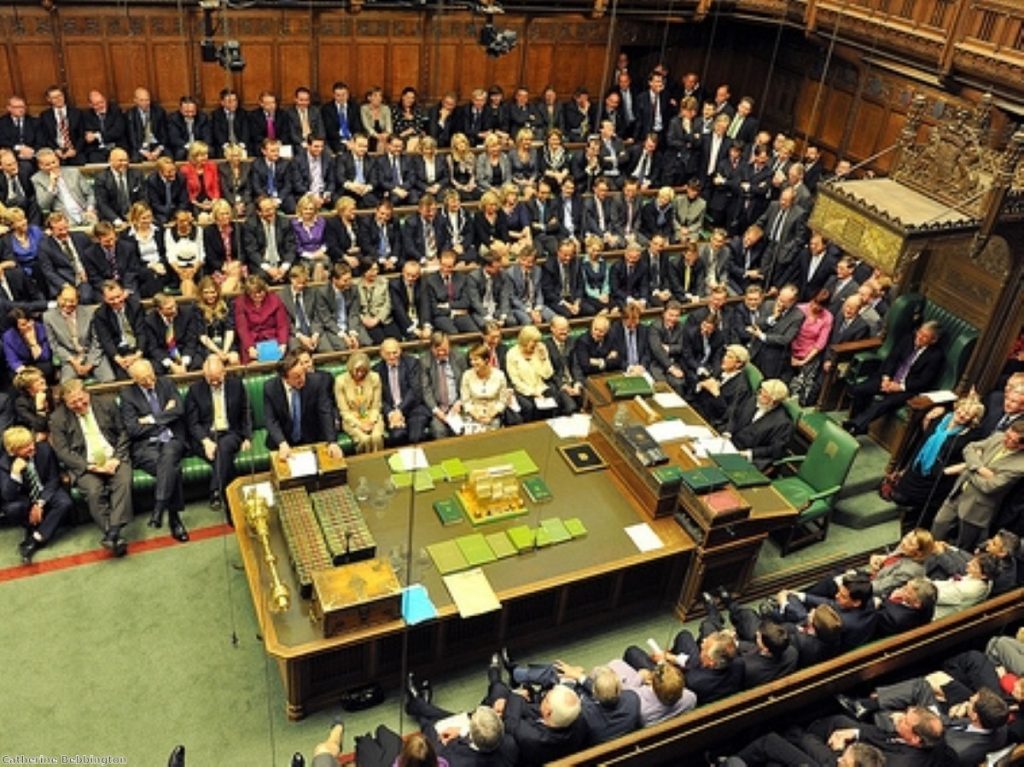Sketch: Recalled MPs couldn’t suppress the politics urge
Recalled MPs tried their best to suppress the urge to make party political points. They almost succeeded.
By Alex Stevenson Follow @alex__stevenson
It's mid-August. At this time of year the Commons chamber is usually full of hordes of schoolchildren on tours of parliament. Not much of a difference from when MPs are around, you might say. For most of the time, that didn't apply today.
It wasn't a rabble of partisan politicians, keen to heckle and barrack each other, who assembled this lunchtime. Instead, the Commons was at its best once again as politicians confronted the riots of recent days.
The prime minister began with a statement. It contained many "today I can announce" beginnings of sentences, the kind which litter party conference speeches and often precede something we've heard before. Today, steps to help businesses and families hit by the riots looked like they would make a real difference.
Cameron repeated his "fightback" rhetoric from yesterday. Ed Miliband stood up and agreed with almost everything he said. Yet the politics was there, submerged for now, but not far beneath the surface.
"To seek to explain is not to seek to excuse," Miliband said. This was Labour's response to Michael Gove's blistering attack on Harriet Harman on Newsnight two nights ago, when she had been roasted for blaming the "out of touch" government for the criminality. Cameron deftly stunned two birds with one stone in reply.
"I hope that in the debates we have, the causes don't immediately fall into a tiresome discussion about resources – where you have deep moral failures you don't hit them with a wall of money," he said. The Tory backbenchers hear-heared enthusiastically. They realised that he had managed to rebut Labour's thrusts against the one big chink in the coalition's armour, the 20% spending cuts faced by the police.
Those Tory MPs who had been braying heartily made some predictably right-wing statements. Sir Peter Tapsell, the father of the House, asked Cameron whether he remembered the US army "wow-nding up wioters" in DC stadium in 1971. Sir Peter was 31 at the time. Cameron was four, which might explain the rumbles of low laughter around the chamber at this point.
Using Wembley would certainly solve the prison overcrowding problem, that's for sure. "I want the Wembley stadium to be available for great sporting events," Cameron told Sir Peter, forgetting that many of the ruckuses surrounding these great sporting events often resemble riots themselves.
A string of even more right-wing government backbenchers followed. Edward Leigh appeared to blame the rioting on the lack of a marriage tax break. Andrew Rosindell wanted the police to return to being "crime fighters and not social workers". David T. C. Davis insisted that "force has to be met with greater force". I hummed Darth Vader's Imperial March under my breath as I scribbled down these comments. It seemed appropriate.
One new phrase we haven't seen before, but which Cameron used at least twice, was the desirability of "surging police". Until now, 'surges' have been strategies employed by struggling US generals in Iraq or Afghanistan. The PM sees a domestic parallel. "One of the lessons we need to learn is the ability to surge the number of police in our communities," he explained.
This is something to plan for next time, which – as a result of this bout of disorder – is likely to be dealt with in a much harsher fashion. "The point I've made is we should be ready for every possible contingency in the future," Cameron explained in response to Nadine Dorries' clear enthusiasm for water cannons, plastic bullets and the like. Yesterday the PM said they would be made available at 24 hours' notice. They weren't appropriate this time round anyway, he argued, because the marauding gangs were fast-moving and never constituted a massed crowd. Dorries didn't look entirely satisfied. She wanted a quicker reaction time. Forty-five minutes might be a decent target time.
Most of the MPs whose constituencies were affected by the rioting offered more moderate views, surprisingly, although Tottenham MP David Lammy's anger of Sunday morning about the police response did not appear to have abated.
Stella Creasy praised community outreach workers in Walthamstow. Heidi Alexander, in Lewisham, was worried by internet sites which glorify knives and guns. Hackney's Diane Abbott, who had called for a curfew, spoke out passionately against knee-jerk reactionary responses. "The further militarisation of the situation we face will not help and may bring things to an even worse level," she warned.
Cameron said on Tuesday he wanted parliament recalled to see MPs "stand together in condemnation of these crimes". He didn't quite get it. Instead a spectrum of opinion, from sombre left-wing concerns to right-wing reaction, slowly emerged.
I was just about to write a congratulatory conclusion, but then Robert Flello, a Labour backbencher, stood up. His points were well-made, but they were drowned out by outraged Tory MPs. They did not object to his politics, but to the fact that he wasn't wearing a jacket. Speaker John Bercow, usually a stickler for this sort of thing, brushed their protests aside. They should "rise to events", he said. As the debate wore on, MPs' own worst habits were starting to reassert themselves.





-01.png)